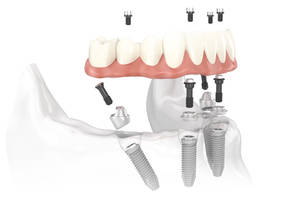Dental implants are the only way to replace all of the parts of the tooth. This means the tooth roots, the crown and the neck of the tooth all get replaced with a dental implant, a crown or an abutment, respectively.

Even bones that are very thin and have lost a lot of their density can be nursed back to health with bone regenerative therapy and bone grafts, so technically speaking there are no age limits to getting dental implants, as getting them at any point in time will greatly improve the quality of your life, and this is beneficial to everyone regardless of age. But there are a few considerations that you may want to take into effect, as the medical health of a person becomes more complicated as we age.
Bone density
The main factor that determines when a dental implant placement will be successful is bone density. If the bones are dense and strong enough, than you can get a dental implant, regardless of any other factors, including age. But bones tend to become more brittle over time, as the calcium deposits on it will make the bones more frail and likely to fracture. Conditions that occur more frequently in old age, like osteoporosis and diabetes are factors that make dental implantation absolutely impossible, and it would be unethical to give a person who is suffering from these systemic diseases dental implants, as their condition can change rapidly regardless of lifestyle.
Haemophilia and other blood related problems
Blood thinners are used by many people in old age, as there are more and more things in the blood that clog it up as we age. This causes many people to take blood thinners, which is a factor that makes dental implantation very complicated, and may even make it absolutely impossible. Hereditary haemophilia is very rare and is a condition you are born with, and it also makes dental implantation impossible.
Cancer
Although the presence of cancer is not a factor in and of itself that makes dental implantation impossible, there are two main reasons why cancer patients are often ineligible for dental implants. One is that many times the tumours are fought with bisphosphonate drugs, which can cause necrosis of the jawbone when dental implants are introduced to it. The other is that many times the health condition of cancer patients is in flux and changes drastically, making the results of dental implantation uncontrollable and impossible to determine. If the condition of the patient is stable though, then there is no obvious reason why you could not implant a cancer patient.
Special dental offer for those who decide to travel and would like to stay in Budapest!
The offer is valid until 31st of December, 2019.





